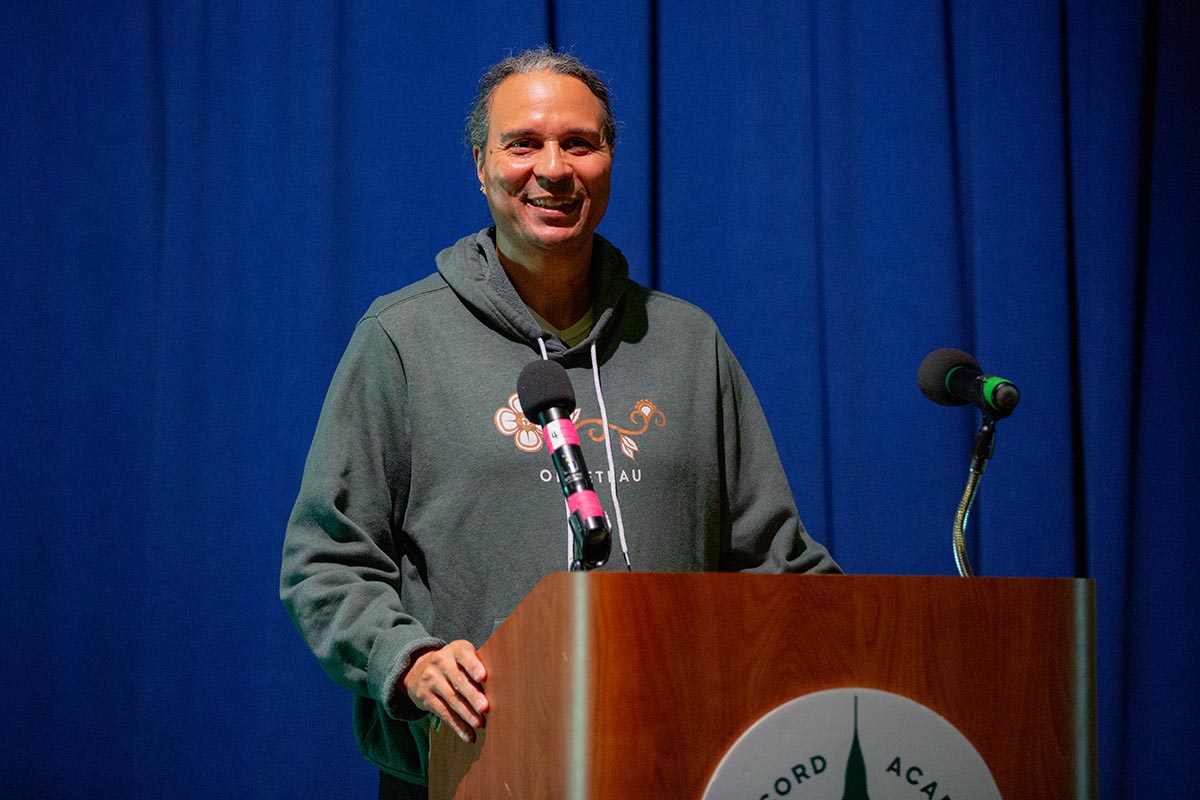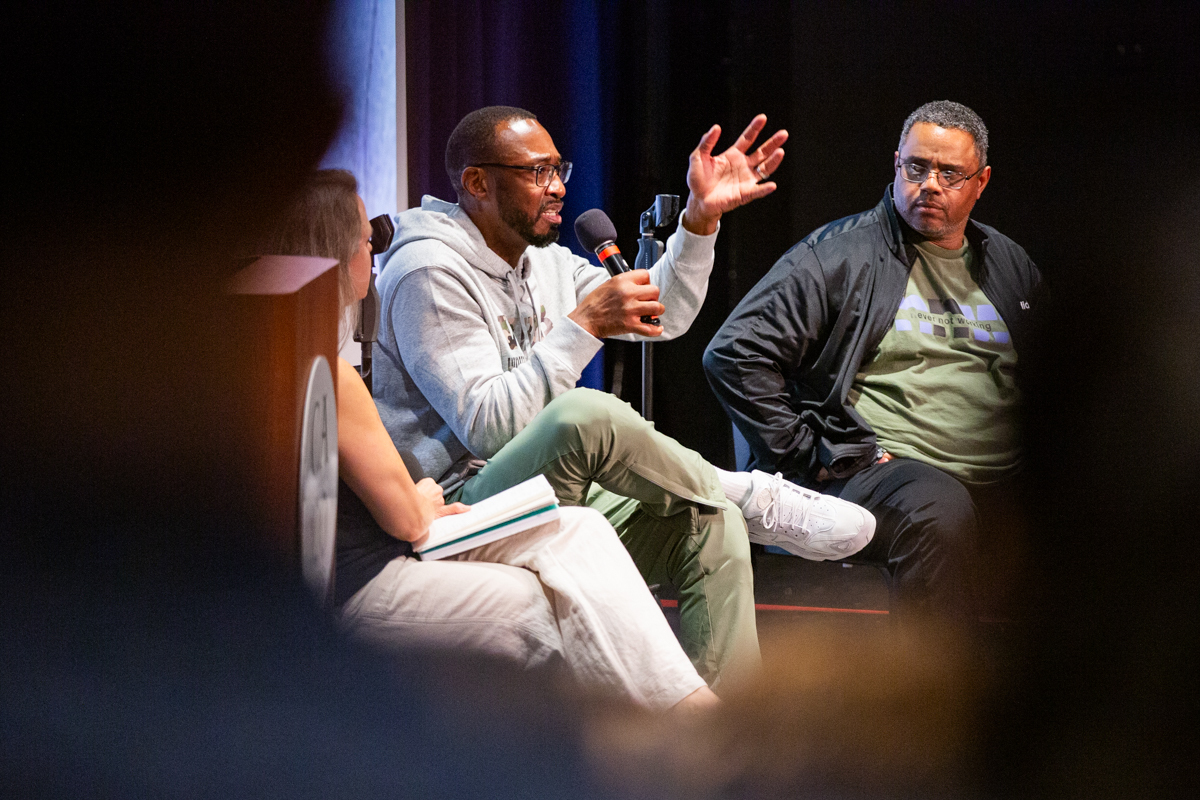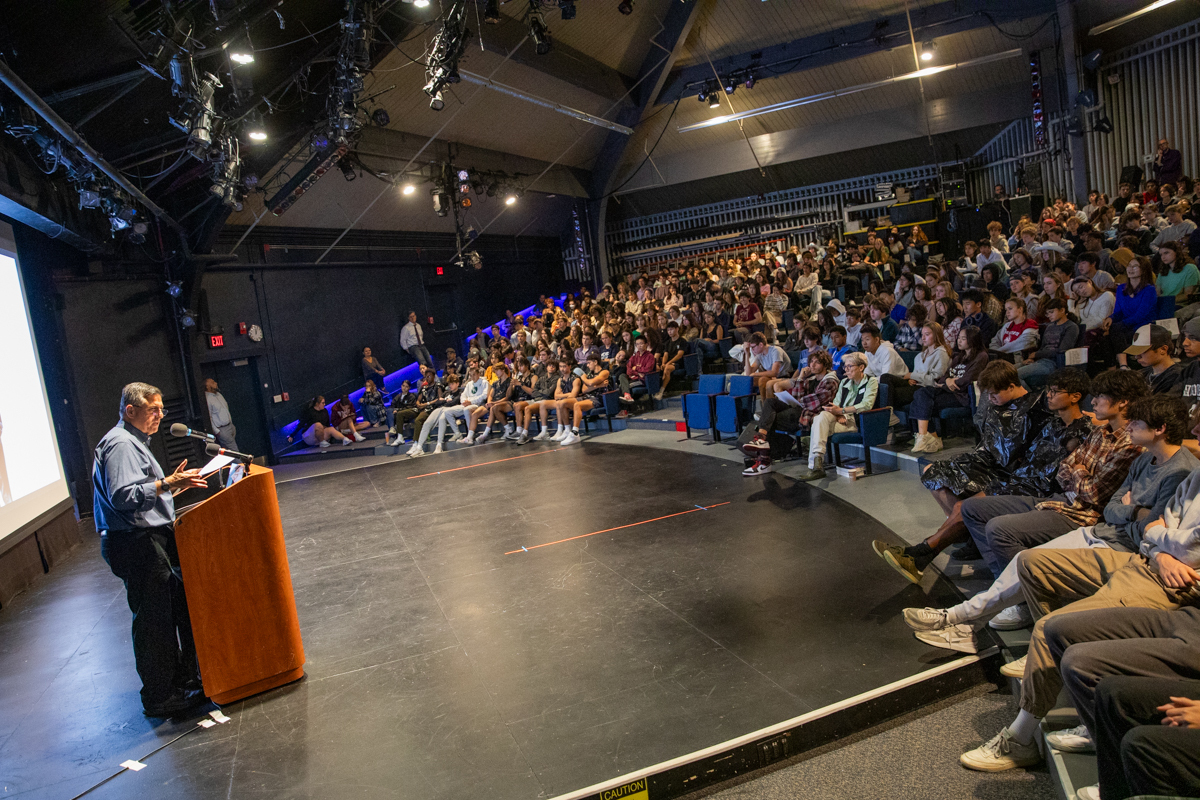CA Assembly Makes Wrongful Conviction Personal

On October 18, 2024, the CA student club Prison Justice Project hosted its fourth assembly at Concord Academy in recognition of Wrongful Conviction Day. Club co-head Izzy Wood ’25 introduced her mother, Lisa Kavanaugh P’22 ’25, director of the Committee for Public Counsel Services (CPCS) Innocence Program, who moderated a discussion with two men who had spent the better part of their lives imprisoned for crimes they didn’t commit—and who since their release had dedicated themselves to helping exonerees and raising awareness about wrongful conviction.
Sean Ellis co-founded the Exoneree Network in coordination with the New England Innocence Project after his release. He now directs the program, which helps exonerees begin to rebuild their lives after decades behind bars. Ellis’ long legal fight for freedom was chronicled in the 2020 serialized Netflix documentary Trial 4, and he was fully exonerated in 2021.
Stephen Pina, now a community engagement associate at the Exoneree Network, was released in 2022 after spending 28 years in prison. While he still awaits formal exoneration, he is an active supporter of others who have been wrongfully convicted, a youth mentor, and a frequent speaker on the topic.
The two men formed a lasting connection early in their involvement with the criminal-legal system when, as strangers, they crossed paths in a holding cell at the West Roxbury District Courthouse in Boston. Ellis, just 19 and disoriented after being arrested for the murder of a Boston police officer he knew nothing about, was cold and shivering. Pina, without making much of it, gave him the sweater he’d been wearing. It was a gesture of human kindness Ellis never forgot. When he and Pina were both later incarcerated at MCI-Walpole, Ellis swore he’d look out for him.
It’s not easy to trust a fellow inmate within a system that incentivizes informants, they told CA students. But it wasn’t too difficult to tell who was innocent in prison: The time an individual spent in the law library was a reliable indicator. Over the years, Ellis and Pina became, in Ellis’ words, “good accountable friends” who eventually talked over their innocence cases together and helped each other avoid getting caught up in the violence and despair of the prison environment. Their families came to know each other too. And Ellis, who had to teach himself the law to advocate for himself—he earned a paralegal certificate while he was in the system—shared what he’d learned with his friend.
“He had patience with me,” Pina said. “Some of who I am is because of how he dealt with me.”
After his release, Ellis held a picture of Pina at a justice walk bringing attention to the plight of the wrongfully convicted. Pina secured an attorney to fight for his release only after an award-winning journalist and professor at Brandeis set her 16 students digging into his case and delivered a 360-page innocence memo to the CPCS Innocence Program. The two mens’ stories underscored how arduous a process overturning wrongful conviction is and the extent of the traumatic impact this miscarriage of justice has on the lives of individuals, families, and communities.
Kavanaugh told CA students she started her career as a trial lawyer in the public defender’s office. “I would meet my clients usually the morning after they’d been arrested and accused of a crime … after they had been, what many people experience as, kidnapped,” she said, contextualizing how someone who had been mistakenly identified by an eyewitness—as both Ellis and Pina were—can experience the sudden involvement in the criminal legal system. Often witnesses are promised protection for their testimony, Kavanaugh explained. It wasn’t until she began innocence work in 2011 that she realized the magnitude of the problem, she said: “Wrongful convictions happen every day, and they happen right here in Massachusetts.”
Asked how wrongful conviction relates to broader injustices in the American carceral system, Ellis contextualized mass incarceration as an extension of the history of slavery in the U.S. “When you’re in prison, it isn’t as though they give you resources and programs to help you deal with trauma,” he said. “It’s more like a warehousing system, and I think it’s intentionally done.”
Kavanaugh added her perspective. “Innocence cases—wrongful conviction cases—allow people to talk about issues that impact every person accused of a crime. It’s a way in. So one of the things I’ve appreciated, as an innocence lawyer as opposed to a trial laywer, is that I can talk about the reality of how the system gets it wrong.” The ability to do that, she suggested, helps people see the reality of that system with impacts that extend far beyond innocence cases.




